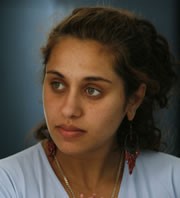Romani, Sinte in Croatia

Photo Source:
Copyrighted © 2026
International Mission Board-SBC All rights reserved. Used with permission |
Send Joshua Project a map of this people group.
|
| People Name: | Romani, Sinte |
| Country: | Croatia |
| 10/40 Window: | No |
| Population: | 17,000 |
| World Population: | 222,900 |
| Primary Language: | Romani, Sinte |
| Primary Religion: | Christianity |
| Christian Adherents: | 70.00 % |
| Evangelicals: | 1.90 % |
| Scripture: | Complete Bible |
| Ministry Resources: | Yes |
| Jesus Film: | Yes |
| Audio Recordings: | Yes |
| People Cluster: | Romani |
| Affinity Bloc: | Eurasian Peoples |
| Progress Level: |
|
Introduction / History
In their original homeland of India, they were originally called Dom, meaning man. Later, Dom developed into Rom. Today, they prefer to be called Romani in Europe; but in the Middle East and North Africa, many still refer to themselves as 'Dom' or 'Domi'. Here, the term 'Dom' will be used for this people group found in the Middle East, and 'Romani' will be used as a general, more recognizable designation for the larger people group.
There are many fascinating folk tales about their origins that are passed down from generation to generation. There are a couple of Romani subgroups, one of which is the Sinte. The Sinte are set apart by having their own dialect. Sinte Romani are scattered all over the world, including the European countries of Germany, Italy, Croatia, Czechia, Poland, Austria and the Netherlands. Others live in Canada and the United States.
What Are Their Lives Like?
Dom lifestyles vary widely. They are often rejected by the majority people, even in Europe. Some blend in with the general population while others live in separate communities.
They have their own code of conduct. Values such as justice and fidelity are significant in Romani society. Such things as courtesy and friendliness are also important. The control of deviants is strictly enforced. If a Romani becomes impure by some immoral or unlawful act, he is considered an outcast.
What Are Their Beliefs?
Sinte Romani people tend to adopt the dominant religion of their host country. In Europe and North America, they might be marginally Christian or Muslim. There are very few known true Christ followers among the Dom. They consider religion a personal matter, and they are hesitant to talk about it with anyone. Superstition and "the good elements" of many religious systems make up the nature of their beliefs. Spiritism is dominant in their thinking as to why things happen in the world. They strongly fear evil spirits and curses. Dom fortunetellers offer to make clients a potion that will ward off curses.
What Are Their Needs?
In almost all the countries they live in, their rudimentary command of the local language and limited use of written documents have contributed to their political powerlessness. Some who have settled are in transition, as they seek to become a part of the social systems around them. To fit in, they may abandon the traditional clothing, tattooing, dancing and fortune telling that are part of the Romani lifestyle. They may even deny their ethnic identity.
Regardless of their efforts to assimilate into the mainstream society, the Dom rarely have official status or citizenship in their country of residence. Due to their poverty, they are often unable to pay hospital fees when children are born. In this case, no birth certificate is issued, so the possibility of securing citizenship is forfeited. Few families own the plots of land on which they locate their settlements or camps. Therefore, they are often subjected to forced relocation.
Prayer Points
Pray for the Holy Spirit to move in Sinte Romani communities throughout Europe and North America.
Pray for Christ followers to live out victorious lives among them, showing them the way to Christ's abundant life.
Pray for Sinte Romani disciples to make more disciples.